You may perceive therapy to be expensive, especially if you don’t have insurance – but it doesn’t have to be this way.
In this article, we’ve explored some affordable therapy options, both online and in-person, and explained how you can get mental health support without breaking the bank.
Want to skip right to the suggestions for affordable therapists? Here are our 8 recommended therapy solutions:
Affordable Therapy Near Me and Online
In this part of the article, we’ve looked at eight ways to access affordable counseling, including online therapy options, as well as an in-person therapist directory.
| Provider | Good For | Location | Pricing |
|---|---|---|---|
| BetterHelp | Quick match with the right therapist for you | Online therapy | $65 to $90 per week (billed every 4 weeks) |
| ReGain | Quick match with the right couples therapist for you | Online therapy | $65 to $90 per week (billed every 4 weeks) |
| Teen Counseling | Teens from ages 13-19 | Online therapy | $65 to $90 per week (billed every 4 weeks) |
| Ritual | Couples guidance through proven interventions | Online service | $100 to $260 per month |
| Find-a-therapist.com | Finding and contacting the right therapist for you | Online and in-person therapy | Varies depending on the counselor fee |
| Online-therapy.com | Finding licensed and experienced therapists with a Cognitive Behavioral Therapy (CBT) approach | Online therapy | $40/week to $88/week (including our 20% discount first month) |
| Calmerry | Depression therapy, online grief counseling, anxiety therapy, therapy for OCD, self-esteem therapy, LGBT-friendly therapy | Online therapy | $49.50 to $73.75 per week (billed monthly) |
| TalkSpace | Depression, anxiety, bipolar disorder, OCD, PTSD, psychiatry | Online therapy | Varies according to insurance coverage or self-pay options |
1. BetterHelp
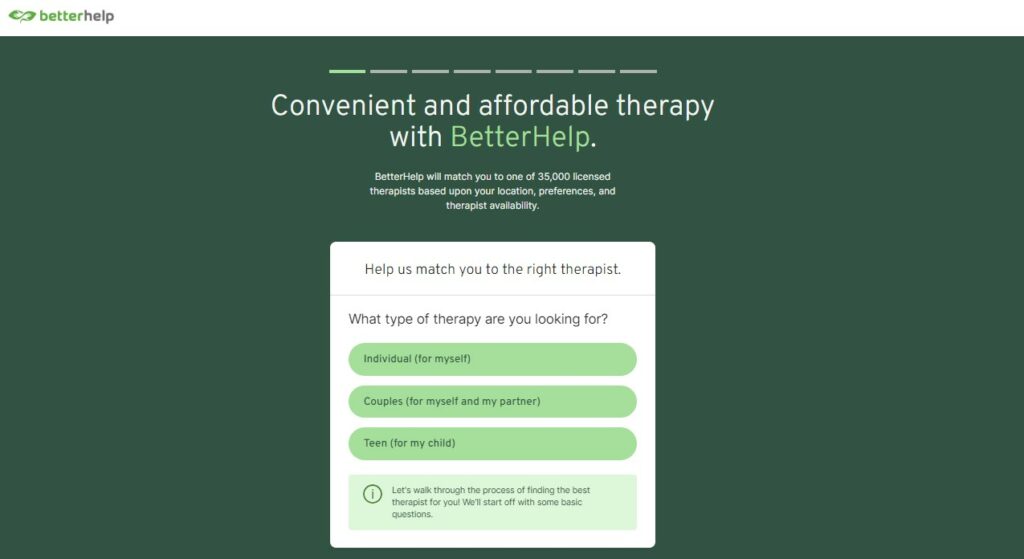
Explore emotional well-being with BetterHelp – your partner in affordable online therapy. With 30,000+ licensed therapists and plans starting from only $65 per week, BetterHelp makes self-care accessible to all. Complete the questionnaire to match with the right therapist.
- Good for: Quick match with the right therapist for you.
- Location: Online therapy.
- Pricing: $65 to $90 per week (billed every 4 weeks).
- Features: iOS and Android app available, message your therapist anytime, live sessions are scheduled weekly and done via live chat, phone, or video call.
BetterHelp is a mental health platform that offers online therapy services for a monthly fee. Licensed, accredited therapists who specialize in a range of different treatments work on this platform, giving you access to a variety of counselors, depending on the issue or issues that you’re going through.
Read our BetterHelp review here.
2. ReGain
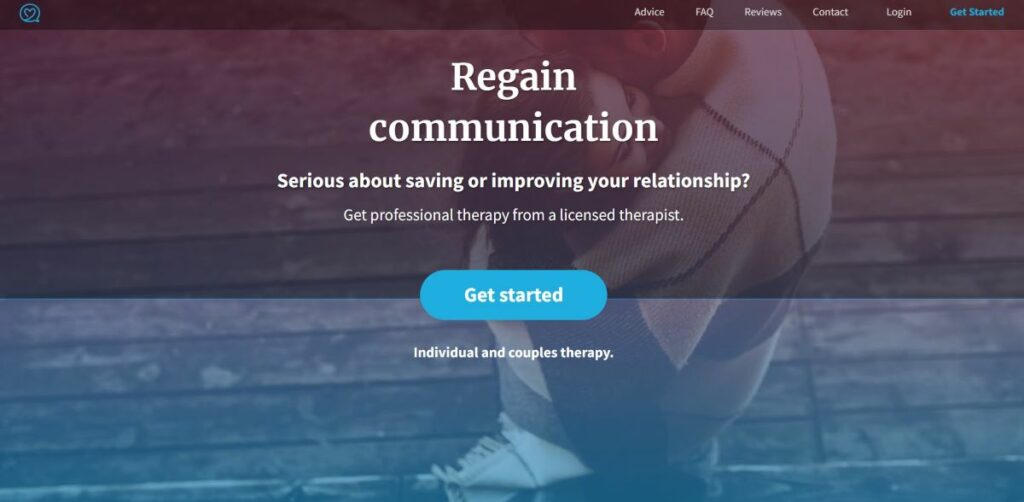
Tailored for individuals and couples navigating relationship or marital issues – ReGain is your online relationship therapy solution. Starting at $65/week, you can schedule one weekly live session and message your therapist anytime. Start your path to healthier connections with ReGain – fill out their online assessment form.
- Good for: Quick match with the right couples therapist for you.
- Location: Online therapy.
- Pricing: $65 to $90 per week (billed every 4 weeks).
- Features: iOS and Android app available, message your therapist anytime, live sessions are scheduled weekly and done via live chat, phone, or video call.
ReGain is an online platform that offers therapy services for couples seeking support for a wide range of relationship issues. ReGain provides a platform for couples and individuals to address their concerns and work toward healthier, more fulfilling relationships.
3. Teen Counseling
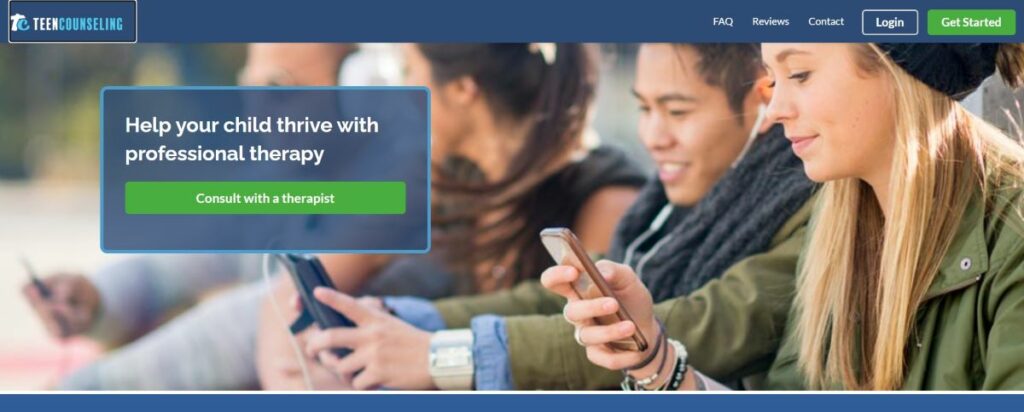
Nurture your teenager’s well-being through Teen Counseling. Tailored for ages 13-19, their online therapy begins at $65/week. This includes a weekly live session, the flexibility to message your therapist at any time, and the opportunity for parents to connect with therapists. Empower your teen’s journey today with Teen Counseling – start with their online questionnaire.
Note: We collaborate with top-tier mental health companies and receive advertising fees from purchases through the Teen Counseling links.
- Good for: Teens from ages 13-19.
- Location: Online therapy.
- Pricing: $65 to $90 per week (billed every 4 weeks).
- Features: The platform is designed to make finding a therapist easy, message your therapist anytime, live sessions are scheduled weekly and done via live chat, phone, or video call.
Teen Counseling is an online therapy platform specifically designed to provide mental health support and counseling services to teenagers (ages 13-19) who may be experiencing a wide range of emotional or behavioral challenges.
4. Ritual
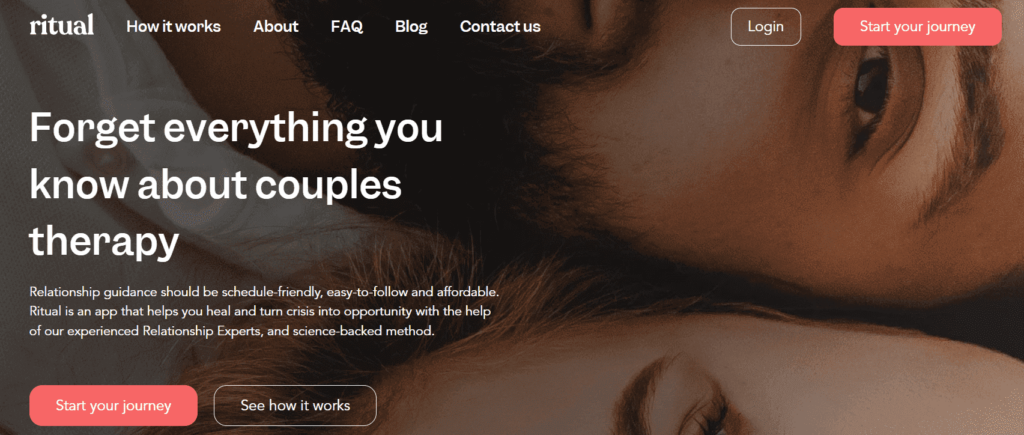
Ritual assists you in healing and transforming relationship issues into opportunities with the aid of their experienced Relationship Experts and science-backed methods. Complete the Ritual assessment to begin rekindling your relationship with 1:1 sessions with experienced professionals, personalized in-app content, guided reflections, and activities between sessions.
- Good for: Couples guidance through proven interventions.
- Location: Online service.
- Pricing: $100 to $260 per month
- Features: 1-1 sessions with relationship experts, online activities and personalized skill-building content, option to join together as a couple or on your own.
Ritual is a relationship support service built around your needs and lifestyle. Schedule short, focused sessions at times that work for you, watch exclusive bite-size content from wherever, whenever, and do short online activities to strengthen your relationship skills.
5. Find-a-therapist.com
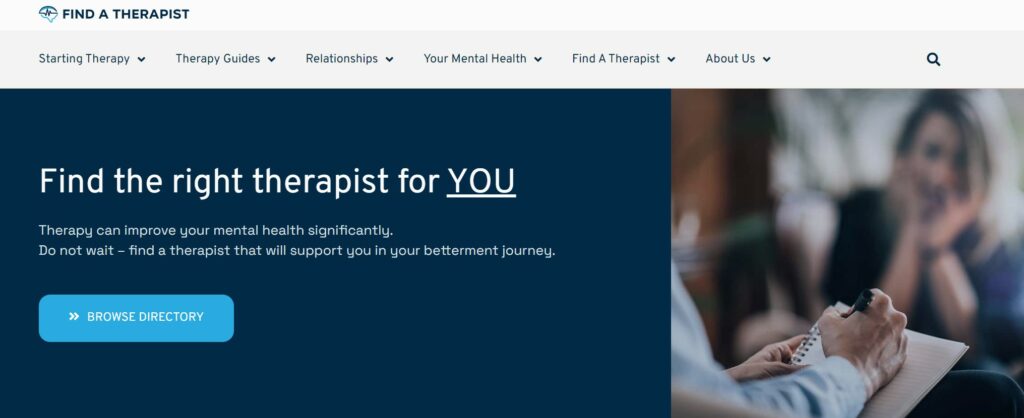
- Good for: Finding and contacting the right therapist for you.
- Location: Online and in-person therapy.
- Pricing: Varies depending on the counselor fee.
- Features: Filter your search, find accessible and effective online and in-person therapy, find guides on different types of therapy.
Find-a-therapist.com is an online directory that connects individuals and couples with licensed therapists and counselors. This platform offers a wide range of specialized therapists to help with your specific needs and goals, including many that offer sliding-scale pricing.
6. Online-therapy.com
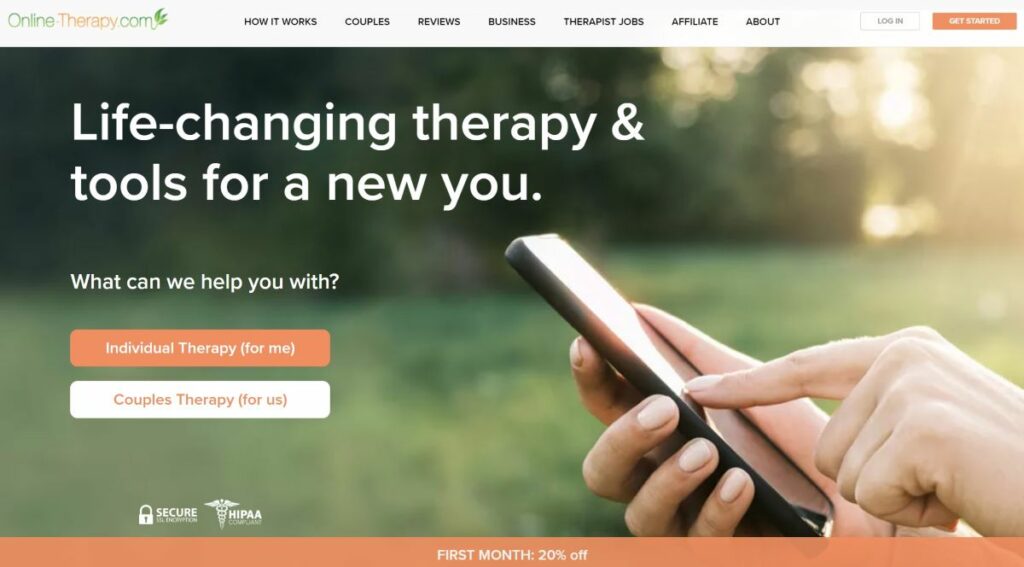
Discover transformative online therapy with Online-therapy.com. Through cognitive behavioral therapy (CBT), Online-therapy.com offers individual and couples support starting at $45/week. Engage in sessions via video, voice, or text for maximum flexibility. Fill out their online questionnaire to get started.
- Good for: Finding licensed and experienced therapists with a Cognitive Behavioral Therapy (CBT) approach.
- Location: Online therapy.
- Pricing: $40/week to $88/week (including our 20% discount first month).
- Features: Unlimited messaging with your therapist, including a daily journal and activity plan, yoga and meditation videos, and tests to see your progress.
Online-therapy.com offers structured treatment programs based on CBT principles, consisting of interactive worksheets, exercises, and educational materials designed to guide individuals through the therapeutic process.
Read our online-therapy.com review here.
7. Calmerry

Embark on a journey of mental wellness with Calmerry. With diverse subscription options, starting at just $50, Calmerry makes prioritizing your mental health simple and accessible. You can message your therapist any day or schedule a live therapy session from the comfort of your home from any device.
- Good for: Depression therapy, online grief counseling, anxiety therapy, therapy for OCD, self-esteem therapy, LGBT-friendly therapy.
- Location: Online therapy.
- Pricing: $49.50 to $73.75 per week (billed monthly).
- Features: Message to your counselor anytime, text therapy and video therapy according to the plan you choose, free counselor switching.
Calmerry is an online therapy platform that offers professional counseling and mental health support to individuals seeking help with various emotional and psychological issues. Therapists utilize evidence-based therapeutic approaches grounded in research and best practices in mental health treatment.
Read our Calmerry review here.
8. TalkSpace
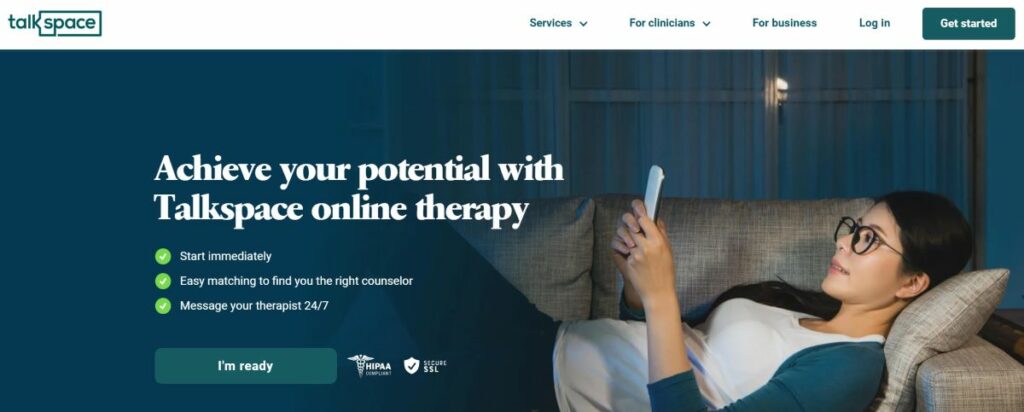
Tailored to individuals, couples, teens, and offering psychiatry services, Talkspace plans kick off at a wallet-friendly $69 per week. What’s more, many health insurances also cover their services, enhancing accessibility and affordability. Complete a questionnaire and get matched with the right therapist for you.
- Good for: Depression, anxiety, bipolar disorder, OCD, PTSD, psychiatry.
- Location: Online therapy.
- Pricing: Varies according to insurance coverage or self-pay options.
- Features: Accepts insurance, live video sessions and unlimited messaging with your therapist, medication management.
TalkSpace is one of the leading online therapy platforms that provides accessible and convenient mental health services. Users can access individual therapy sessions, as well as couples therapy, teen counseling, and psychiatry services.
Read our TalkSpace review here.
How to Find an Affordable In-person Therapist

Finding an affordable in-person therapist may seem difficult, but it doesn’t have to be if you know what to look for.
In this part of the article, we’ve discussed what you should know when searching for an affordable in-person therapist.
Check Your Insurance Coverage
Most health insurance plans in the US cover some level of mental health treatment. This is often the best way to save money on counseling, as it can lower the cost of therapy significantly.
To do this, you should check with your insurance company and see what your coverage includes. This way, you will know what you can expect to pay out of pocket.
The coverage of therapy services by insurance companies in the United States can vary depending on a number of factors. In general, many insurance plans cover some forms of therapy provided by licensed mental health professionals, such as psychologists or counselors.
However, the extent to which therapy is covered can vary from one insurance plan to another. It’s best to check with your provider for more specific information. Additionally, some insurance plans may have limits on the number of sessions covered, or they may require a referral from a primary healthcare physician.
Consider online therapy
If you don’t have insurance, or if making a claim would still involve high out-of-pocket costs, consider trying online therapy.
Online therapy is usually more affordable than in-person therapy if you don’t have insurance, and it’s often just as effective.
Try to Find a Therapist That Offers Sliding-Scale Pricing

If you don’t have insurance, and you want to see a therapist in person, you can try searching for therapists who offer sliding scale pricing, meaning that what they charge is based on your income and financial situation.
Sites such as Find-a-therapist.com allow you to look for therapists that offer sliding scale pricing, using their search filter.
To access sliding-scale therapy, you may need to prove your income level to your therapist, such as by providing payslips or a bank statement.
Community-Based or Non-Profit Clinics
There are non-profit organizations that can help you find affordable, and sometimes even free, therapy and counseling. However, these resources can be hard to find, and it can be difficult to tell whether these services provide access to quality support or not.
Here, we’ve mentioned some places to check out if you’re looking for affordable therapy.
1. Non-Profit Organizations
There are non-profit organizations that offer low-cost counseling services. One of these is National Alliance on Mental Illness (NAMI), a non-profit organization offering affordable therapy services to those in need.
2. Employee Assistance Programs (EAPs)
If you’re employed, it might be worth looking into Employee Assistance Programs, which are work-based programs providing mental health services to employees. Mental health issues most commonly covered by EAPs include stress, anxiety, depression, relationship problems, and substance abuse.
Employee Assistance Programs may also refer you to other local resources and support groups, depending on the nature of your issue.
3. Community Health Centers

These non-profit organizations provide primary health care services to those in need. They work on improving access to health care for everyone, especially uninsured, underinsured, or low-income people.
CHCs usually offer preventive care, diagnosis and treatment of illnesses, management of chronic conditions, and health education. They also offer affordable mental health services.
People working in CHCs are accredited professionals, including doctors, nurses, psychologists, and counselors.
4. Universities and Colleges
If you’re a student, you should check to see whether your university or college has counseling centers that offer low-cost or free therapy services to students.
These services are usually limited to general counseling, but they can still be useful if you’re under stress, or feeling anxious or depressed – especially if your issues have something to do with university or college duties.
5. Crisis Hotlines
Crisis hotlines serve as a vital support system for people who are going through a difficult time and need immediate help, whether they are feeling suicidal or just need someone to talk to.
Trained and accredited professionals are available to offer support and guidance in these moments of crisis. Although hotlines may not provide ongoing therapy or counseling, they can still make a significant impact if you need immediate assistance.
If you are feeling suicidal, please call the National Suicide Prevention Lifeline at 1-800-273-8255.
How Much Cheaper is Online Counseling Compared to In-Person Counseling?

Below, we’ve compared the cost of online and in-person therapy in more detail, to help you see how much money you could save using an online counseling service.
The Price of In-Person Therapy
The cost of in-person therapy can vary depending on several factors, such as the type of therapy, the therapist’s experience and qualifications, your location, and the type of insurance you have.
For example, specialized treatments such as Cognitive-Behavioral Therapy may cost more than general counseling. Also, if your therapist is located in the city center, they might charge more because their office costs a lot of money to rent.
The price of an in-person therapy session can fall anywhere between $100 and $300, with an average of $150 – $200 per session in the United States.
The Price of Online Therapy
In comparison to face-to-face counseling, the price of online therapy can be significantly lower.
Many online therapy platforms offer subscription-based pricing models. Individuals typically pay a flat fee for unlimited messaging or a set number of live sessions per week or month.
Prices may range from around $40 to $100 or more per week, depending on the level of access and services included.
Is Online Therapy Effective?

Research has indicated that online therapy can be just as effective as in-person therapy, and talk therapy can be especially beneficial.
One of the most common psychotherapeutic approaches conducted over the phone or video is Cognitive-Behavioral Therapy (CBT).
CBT is a popular, scientifically proven therapy method, used to treat a variety of different mental health issues, such as anxiety or depressive disorders, life crises, issues with self-confidence and self-esteem, as well as grieving and loss.
Are Free Therapy Services Safe to Use?
The safety and quality of free therapy services can vary greatly, depending on a couple of factors you should take into consideration.
The first and most important factor is the therapist’s qualifications and credentials. If the therapist doesn’t have proper credentials, qualifications, and experience, they may not be able to support you, and may in fact make your mental health condition worse.
Free therapy services might be offered by people who don’t have a background in counseling or proper licensing, so it’s important to check that first.
It’s also worth noting that, even though some free therapy services are safe and effective, there might be limitations in terms of the length and frequency of sessions, the level of support provided, and the types of therapy available.
Therefore, if at all possible, it’s best to seek out low-cost (rather than free) therapy sessions from a counselor with the appropriate qualifications and licensing to support your recovery.
Conclusion
Finding a good quality affordable therapist can seem like a formidable endeavor. While online therapy can be an affordable and convenient option for most people, it’s not for everyone. If you’d prefer to see a therapist in person, your best bet is to try and find a counselor that offers sliding-scale pricing.
If you’re still not sure how best to find an affordable therapist, contact us and we’ll get back to you.
References
Barak, A., Hen, L., Boniel-Nissim, M., & Shapira, N. A. (2014). A comprehensive review and a meta-analysis of the effectiveness of internet-based psychotherapeutic interventions. Internet-Delivered Therapeutic Interventions in Human Services, 5-55. Link.
Richards, D., & Viganó, N. (2013). Online counseling: A narrative and critical review of the literature. Journal of clinical psychology, 69(9), 994-1011. Link.





